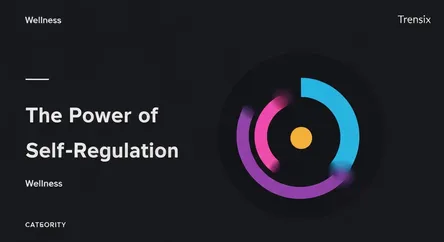Wellness
The Power of Self-Regulation

Learn the art of managing your thoughts, emotions, and behaviors to reduce stress, improve focus, and achieve your long-term wellness goals.
What is it?
Self-regulation is the ability to manage your own thoughts, emotions, and behaviors in pursuit of long-term goals. It's the conscious process of monitoring your internal states and external actions and adjusting them to meet personal standards and situational demands. This vital skill allows you to control impulses, handle frustration, and think before acting, rather than being driven by immediate feelings. It involves self-awareness to recognize your patterns, motivation to meet your standards, and the willpower to control urges and make choices that align with your deepest values.
Why is it trending?
The growing emphasis on mental health and holistic wellness has pushed self-regulation into the spotlight. In a world of constant stress and digital distractions, people are actively seeking effective strategies to manage anxiety, prevent burnout, and find a healthier work-life balance. Mindfulness and other self-regulatory techniques are gaining popularity as practical tools to enhance mental clarity and emotional stability. As awareness of its benefits grows, more people are recognizing self-regulation not just as a coping mechanism, but as a foundational skill for personal growth and empowerment.
How does it affect people?
Developing self-regulation skills profoundly impacts overall well-being. It leads to better emotional stability, allowing individuals to navigate life's highs and lows with greater resilience. This skill is crucial for building stronger relationships, as it helps in managing conflict and communicating effectively. On a personal level, it boosts self-confidence and is strongly linked to achieving academic and professional success by improving focus and discipline. Ultimately, practicing self-regulation helps people reduce stress, make healthier choices, and lead a more balanced and fulfilling life.